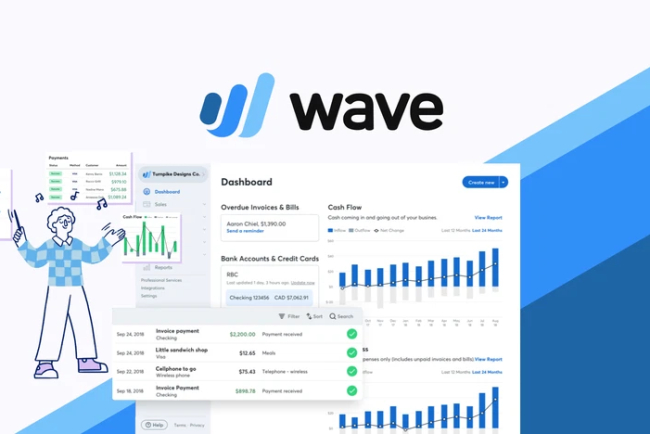Which are big 4 accounting firms?
Discover the world's most powerful accounting giants! This comprehensive guide explores the Big 4 accounting firms—Deloitte, PwC, EY, and KPMG—that audit 95% of Fortune 500 companies and generate $180+ billion annually. Learn about their origins, services, global impact, and why they're essential for business credibility and growth. Plus, discover how modern businesses can apply Big 4 success principles through integrated business solutions for POS, CRM, digital marketing, and automation. Key Topics Covered: Complete profiles of all Big 4 firms (Deloitte, PwC, EY, KPMG) Their role in global business and financial markets Services: auditing, consulting, tax, and advisory Why they matter for business trust and compliance How to apply their success strategies to your business Modern business solutions for growth and efficiency Perfect for: Business owners, entrepreneurs, finance professionals, students, and anyone interested in understanding global business infrastructure
Introduction
In the high-stakes world of global finance, where billion-dollar decisions are made daily and corporate transparency can determine the fate of entire economies, four names stand as the ultimate guardians of financial trust: Deloitte, PwC, EY, and KPMG. These aren't just accounting firms—they're the financial powerhouses that audit nearly every major corporation, government, and institution worldwide.
Here's a staggering fact: The Big 4 accounting firms collectively audit over 78% of all public companies globally and generate combined annual revenues exceeding $180 billion. They employ more than 1.5 million professionals across 190+ countries, making them some of the largest employers in the professional services sector. But what exactly makes these four firms so indispensable to the global economy?
Accounting and auditing firms serve as the critical backbone of financial credibility in our interconnected business world. When a Fortune 500 company reports its quarterly earnings, when a government publishes its national budget, or when a startup seeks investment funding, these claims must be verified, validated, and certified by independent experts. Without this layer of professional scrutiny, the entire foundation of modern capitalism would collapse under uncertainty, fraud, and mistrust.
The term "Big 4" emerged in the early 2000s following a dramatic industry consolidation and the infamous collapse of Arthur Andersen due to the Enron scandal. What was once the "Big 5" became the "Big 4," and these remaining firms have since grown exponentially in size, scope, and influence. Today, they don't just audit financial statements—they shape business strategies, drive digital transformations, advise on mergers and acquisitions, and influence how organizations operate in an increasingly complex global marketplace.
Understanding these four giants isn't just academic curiosity; it's essential knowledge for anyone serious about business growth, financial integrity, and corporate success in the 21st century.
Deep Explanation of the Big 4
1. Deloitte: The Innovation Pioneer and Global Leader
Origins and Historical Evolution
Deloitte stands as both the oldest and largest of the Big 4 accounting firms. Founded in 1845 by William Welch Deloitte in London, the firm has witnessed and adapted to nearly two centuries of business evolution. What began as a single accountant's practice has transformed into a global consulting and professional services empire that consistently ranks as the world's largest by revenue.
Deloitte's progressive mindset emerged early in its history. In 1930, they became the first major accounting firm to appoint a female partner—decades ahead of their competitors and society at large. This forward-thinking approach has remained a cornerstone of their corporate culture, making them pioneers not only in service delivery but also in workplace diversity, technological innovation, and business transformation.
The firm's modern structure emerged through strategic mergers, most notably the 1989 merger with Touche Ross, which created Deloitte & Touche. Subsequent international expansions and acquisitions have built the comprehensive global network we see today.
Core Services and Market Specializations
Deloitte operates through four primary service pillars:
Audit & Assurance: Traditional financial audits, risk management, regulatory compliance, and financial reporting. They serve as auditors for major corporations like General Motors, Procter & Gamble, and numerous Fortune 500 companies.
Consulting: This is Deloitte's largest and fastest-growing division, covering strategy consulting, operations improvement, technology implementation, and human capital management. Their consulting arm competes directly with traditional strategy firms like McKinsey and BCG.
Tax Services: Comprehensive tax planning, compliance, international tax strategy, and specialized tax advisory services for multinational corporations.
Financial Advisory: Merger and acquisition advisory, corporate restructuring, forensic accounting, and dispute resolution services.
What truly distinguishes Deloitte is their massive investment in emerging technologies and digital transformation. Their "Deloitte Digital" division operates almost like a separate tech company, offering end-to-end digital solutions, user experience design, and technology implementation. They've developed specialized practices around artificial intelligence, blockchain technology, cybersecurity, and cloud transformation.
Global Impact and Notable Achievements
Deloitte's global reach is truly staggering—they operate in over 150 countries and serve approximately 90% of Fortune 500 companies. Their annual revenue exceeds $59 billion, making them not just the largest accounting firm but one of the largest professional services organizations in the world.
Some of their most impactful client relationships include helping Netflix transition from DVD rentals to streaming dominance, advising Microsoft on cloud strategy, and guiding numerous companies through digital transformation initiatives during the COVID-19 pandemic.
2. PricewaterhouseCoopers (PwC): The Trust Builder and Market Stabilizer
Heritage and Strategic Formation
PwC represents one of the most successful corporate mergers in professional services history. Formed in 1998 through the merger of Price Waterhouse (founded 1849) and Coopers & Lybrand (founded 1854), this wasn't merely a combination of two firms—it was the creation of a global powerhouse designed specifically for the interconnected, digital economy.
Price Waterhouse had already established itself as the auditor of choice for governments and blue-chip corporations, bringing prestige and regulatory expertise. Coopers & Lybrand contributed deep management consulting capabilities and industry specialization. The merger created a firm uniquely positioned to serve both traditional industries and emerging technology sectors.
Service Excellence and Technological Innovation
PwC structures its services around three core areas:
Assurance Services: Financial audits, risk assurance, regulatory compliance, and increasingly, sustainability and ESG reporting. They're pioneers in integrating environmental and social governance factors into traditional financial auditing.
Advisory Services: This includes deal advisory (M&A), consulting services, cybersecurity, and forensic investigations. Their advisory practice has grown significantly, often competing with specialized consulting firms.
Tax and Legal Services: Global tax strategy, international tax planning, legal services (in jurisdictions where permitted), and regulatory compliance.
PwC has made substantial investments in artificial intelligence and data analytics. Their "Halo" platform uses machine learning algorithms to analyze vast amounts of financial data, detecting anomalies and risks that traditional auditing methods might miss. This technological sophistication has made them the preferred auditor for many technology companies and financial institutions.
Market Position and Strategic Relationships
PwC audits approximately 40% of Fortune 500 companies and maintains exclusive relationships with major financial markets worldwide. They audit the London Stock Exchange, NASDAQ, and numerous other exchanges, providing them with unparalleled insight into global financial trends and market movements.
Their prestigious client roster includes Amazon, Berkshire Hathaway, JPMorgan Chase, and Google's parent company Alphabet. PwC was also selected to audit the United Nations' Sustainable Development Goals implementation, showcasing their role in global governance and social responsibility initiatives.
3. Ernst & Young (EY): The Entrepreneurial Spirit and Growth Catalyst
Foundation and Entrepreneurial Evolution
Ernst & Young emerged from the 1989 merger of Arthur Young & Company and Ernst & Whinney, but its roots trace back much further. Arthur Young was founded in Chicago in 1894, while Ernst & Ernst began in Cleveland in 1903. The merger created a firm with a distinctly entrepreneurial culture that has consistently focused on serving high-growth companies and emerging markets.
EY has always positioned itself as the "entrepreneurial" choice among the Big 4, actively courting startups, scale-ups, and companies in rapid growth phases. This positioning has paid dividends, as they've built strong relationships with many companies that have grown from startups to global giants.
Service Portfolio and Market Focus
EY organizes its services into four main areas:
Assurance: Financial audits, climate change and sustainability services, and risk management. They've been particularly innovative in developing ESG (Environmental, Social, and Governance) auditing capabilities.
Consulting: Technology consulting, risk consulting, and performance improvement services. Their consulting practice has grown rapidly through both organic growth and strategic acquisitions.
Strategy and Transactions: M&A advisory, corporate finance, restructuring, and strategic planning services.
Tax: Global tax planning, international tax compliance, and specialized tax advisory for complex multinational structures.
EY has made significant investments in emerging technologies, particularly in areas like blockchain, artificial intelligence, and robotic process automation. Their "EY Helix" platform combines analytics, technology, and industry expertise to deliver insights-driven services.
Innovation and Digital Transformation Leadership
EY has positioned itself as a leader in digital transformation and innovation. They've established innovation labs in major cities worldwide and have invested heavily in developing proprietary technologies. Their "EY badges" program helps professionals develop digital skills, ensuring their workforce remains current with technological advances.
The firm has been particularly successful in serving technology companies and has built strong relationships with many unicorn startups and high-growth technology firms. This focus on innovation and entrepreneurship has helped them maintain relevance in rapidly changing business environments.
4. KPMG: The Industry Specialist and Regulatory Expert
Historical Development and Specialization
KPMG was formed in 1987 through the merger of Klynveld Main Goerdeler (KMG) and Peat Marwick Mitchell & Co., creating a firm with deep industry specialization and regulatory expertise. The firm's roots trace back to 1897, and throughout its history, KPMG has built a reputation as the most specialized and industry-focused of the Big 4.
KPMG has consistently positioned itself as the firm that understands specific industries better than its competitors. Rather than trying to be all things to all clients, they've developed deep expertise in sectors like financial services, healthcare, automotive, and energy.
Service Capabilities and Industry Focus
KPMG's services are organized around three core areas:
Audit: Financial statement audits, regulatory compliance, and risk assessment services. They're particularly strong in highly regulated industries like banking, insurance, and healthcare.
Advisory: This includes management consulting, deal advisory, risk consulting, and technology services. Their advisory practice has grown significantly and now represents a major portion of their revenue.
Tax: Tax compliance, tax planning, and specialized tax advisory services, with particular strength in international tax and transfer pricing.
KPMG's industry specialization sets them apart. They've developed specialized teams for financial services, healthcare, technology, automotive, energy, and other sectors. This deep industry knowledge allows them to provide more targeted and relevant advice to their clients.
Regulatory Expertise and Market Position
KPMG has built a strong reputation in regulatory compliance and risk management. They work closely with regulators worldwide and are often called upon to help organizations navigate complex regulatory environments. This expertise has made them particularly valuable during times of regulatory change or crisis.
The firm serves many of the world's largest banks, insurance companies, and other financial institutions. Their regulatory expertise and industry specialization have made them the go-to choice for organizations in highly regulated sectors.
Why the Big 4 Matter for Modern Businesses
Trust Building and Market Credibility
The Big 4 accounting firms serve as crucial trust intermediaries in the global economy. When a company's financial statements are audited by one of these firms, it provides stakeholders—investors, lenders, regulators, and partners—with confidence in the accuracy and reliability of the reported information. This trust is fundamental to the functioning of capital markets and international trade.
For publicly traded companies, having a Big 4 auditor is often essential for maintaining investor confidence and meeting regulatory requirements. The reputation and global reach of these firms provide a level of credibility that smaller accounting firms simply cannot match.
Regulatory Compliance and Risk Management
In an increasingly complex regulatory environment, the Big 4 firms help organizations navigate compliance requirements across multiple jurisdictions. They stay current with changing regulations, tax laws, and reporting standards, ensuring their clients remain compliant and avoid costly penalties or legal issues.
Their risk management services help organizations identify, assess, and mitigate various types of risk—from financial and operational risks to cybersecurity and regulatory risks. This comprehensive risk management approach is essential for modern businesses operating in volatile and uncertain environments.
Strategic Guidance and Digital Transformation
Beyond traditional accounting and auditing services, the Big 4 have evolved into strategic advisors that help organizations transform and grow. Their consulting services cover strategy development, operational improvement, technology implementation, and organizational change management.
In the digital age, these firms have become crucial partners in helping traditional businesses adapt to technological disruption and digital transformation. They provide both the strategic vision and the practical implementation capabilities needed to succeed in rapidly changing markets.
Global Reach and Local Expertise
The Big 4 firms offer a unique combination of global reach and local expertise. They can serve multinational corporations with consistent service quality across all their global operations while also understanding local market conditions, regulations, and business practices.
This global-local combination is particularly valuable for companies expanding internationally or operating in multiple markets. The Big 4 can provide coordinated services across all locations while ensuring compliance with local requirements and customs.
Learning from Big 4 Systems and Strategies
Even businesses that never directly engage with the Big 4 can learn valuable lessons from their approaches to quality management, professional development, knowledge management, and client service. These firms have developed sophisticated systems for managing large, complex organizations and delivering consistent, high-quality services across diverse markets and service lines.
Their emphasis on continuous learning, technology adoption, and professional development provides a model for other organizations seeking to build capabilities and compete effectively in knowledge-intensive industries.
How Modern Business Success Connects to Professional Tools
Just as the Big 4 accounting firms empower the world's largest corporations with comprehensive financial management, compliance, and strategic advisory services, every business—regardless of size—needs robust tools and systems to manage operations, engage customers, and drive sustainable growth.
The same principles that make the Big 4 successful—systematic processes, data-driven decision making, technology integration, and comprehensive service delivery—apply to businesses of all sizes. Modern companies need integrated solutions that can handle point-of-sale transactions, manage customer relationships, execute digital marketing campaigns, provide learning and development capabilities, and automate routine processes.
This is where specialized business technology solutions become crucial for growth and competitiveness.
Transform Your Business with Gomsu Information Technologies
While the Big 4 serve the world's largest enterprises, Gomsu Information Technologies brings enterprise-level capabilities to businesses of all sizes through our comprehensive suite of business management solutions.
Our Core Solutions:
Point of Sale (POS) Systems: Streamline your sales processes with advanced POS technology that integrates inventory management, payment processing, and sales analytics. Our POS solutions help you track performance, manage stock, and improve customer experiences.
Customer Relationship Management (CRM): Build stronger customer relationships with our comprehensive CRM platform. Track interactions, manage sales pipelines, automate follow-ups, and gain insights into customer behavior to drive revenue growth.
Social Media Marketing: Expand your digital presence with our professional social media marketing services. We help you create engaging content, build brand awareness, reach target audiences, and convert social media engagement into business results.
Learning Management Systems (LMS): Invest in your team's growth with our advanced LMS platform. Deliver training programs, track progress, ensure compliance, and build organizational capabilities that drive long-term success.
Business Process Automation: Eliminate manual tasks and reduce errors with our automation solutions. From workflow automation to data processing, we help you operate more efficiently and focus on strategic activities.
Why Choose Gomsu Information Technologies?
>Proven Track Record: We've helped hundreds of businesses implement successful technology solutions
>Comprehensive Integration: Our solutions work together seamlessly to create a unified business management ecosystem
>Expert Support: Our team provides ongoing training, support, and optimization services > Scalable Solutions: Our platforms grow with your business, from startup to enterprise > Cost-Effective: Get enterprise-level capabilities at prices that work for your budget
Special Limited-Time Offer
For a limited time, we're offering significant discounts on our complete business solution packages. Whether you need a single solution or want to implement our comprehensive business management suite, now is the perfect time to invest in your company's growth and efficiency.
Don't let outdated systems and manual processes hold your business back. Join the hundreds of successful companies that have transformed their operations with Gomsu's proven solutions.
Conclusion
The Big 4 accounting firms—Deloitte, PwC, EY, and KPMG—represent the pinnacle of professional services excellence. They've built their success through systematic processes, technology integration, comprehensive service delivery, and unwavering commitment to quality and client success. These same principles apply to businesses of all sizes seeking sustainable growth and market success.
Just as Fortune 500 companies rely on the Big 4 for financial integrity and strategic guidance, every modern business needs reliable tools and systems to manage operations, engage customers, and drive growth effectively. The key is choosing solutions that integrate seamlessly, scale with your business, and provide the insights and automation needed to compete successfully.
Whether you're inspired by the systematic excellence of the Big 4 or simply looking to improve your business operations, the right technology tools and professional services can make the difference between struggling to keep up and achieving breakthrough growth.
If you found this blog helpful, please Like, Share, and Comment below!
Have any doubts or suggestions about business growth strategies or the Big 4? Let us know—we'd love to hear from you and continue the conversation.
Subscribe to our newsletter to never miss updates on business insights, growth strategies, and technology solutions that can transform your business success.
What's Your Reaction?






















